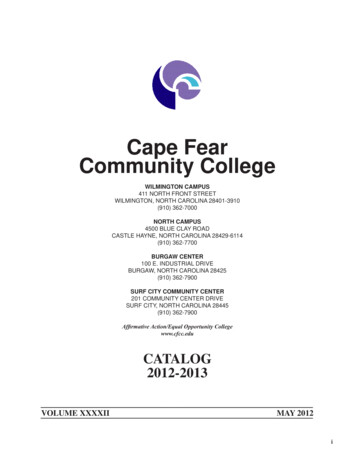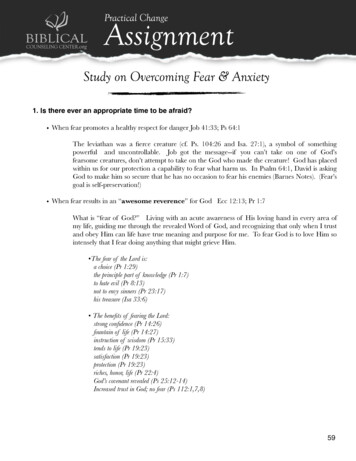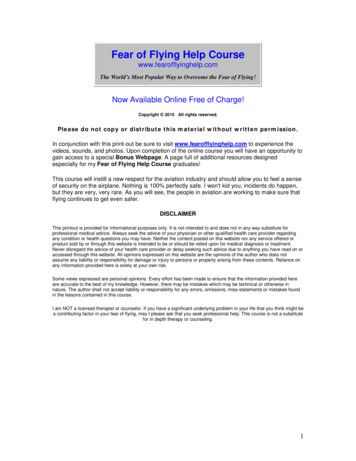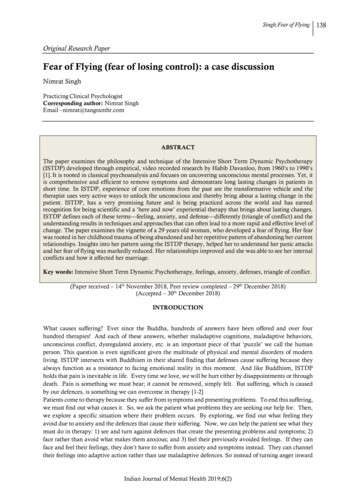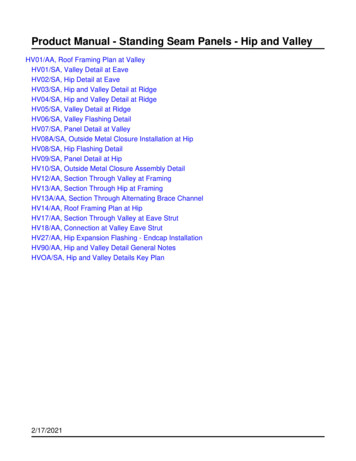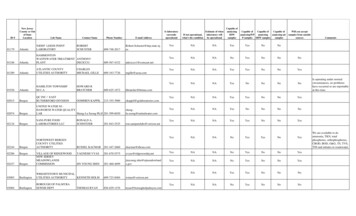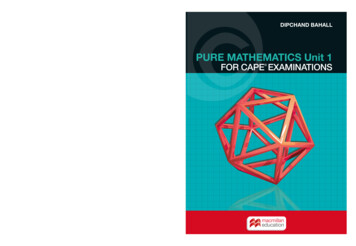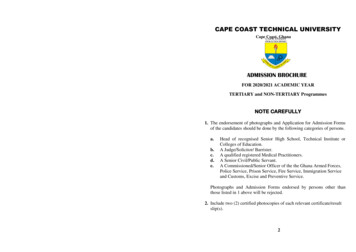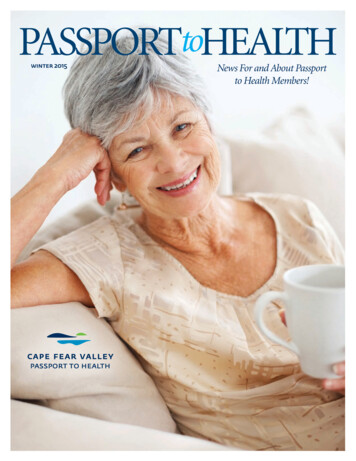
Transcription
PASSPORTtoHEALTHwinter 2015News For and About Passportto Health Members!
Passport To Health is a program formembers ages 50 and better.officePassport To Health3522 Village DrivePhone: (910) 615-4600Fax: (910) 615-5385Office hours vary.Please call before stopping by.mailing addressCape Fear Valley HealthAttn: Passport To HealthP.O. Box 2000Fayetteville, NC 28302-2000educational topic lineFor the topic of the month to bepresented at Passport To Health’smonthly educational meeting andother upcoming events, please call(910) 615-4468.This newsletter is published by theMarketing and Outreach Departmentof Cape Fear Valley Health Systemfor Passport To Health members,physicians, senior centers andcommunity agencies.Editor: Anna AckermanPassport To Health Manageraackerman@capefearvalley.comThis educational information isprovided to supplement the careprovided by your physician. It isnot intended to be substituted forprofessional medical advice. Alwaysconsult your physician with anyquestions you may have regardinga medical condition.2topperf rmerrecognized as aChoose a hospital thatdelivers exceptional careIf you were looking for a hospital that provided exceptional care, you couldpour over graphs showing compliance with every measure of evidence-basedcare. Or you could do it the easy way. The Joint Commission, an independentorganization that accredits and certifies more than 20,500 healthcareorganizations across the nation, has done the work for you. Their TopPerformer award recognizes hospitals providing exceptional care.Cape Fear Valley has been recognized as a top performer in four areas:heart attack :: heart failure :: pneumonia :: surgical careTop Performer status means Cape Fear Valley Health provides the mostup-to-date, scientifically based care as compared to anywhere in the country.And it’s right here in Fayetteville close to family and friends.When you choose Cape Fear Valley, you’re putting yourself in capeable hands.
from annaDear Friends,Happy New Year! It’s hard to believe there is already another year upon us. I’m happy tosay that 2014 was a great year for me. I look forward to another year of excitement, newprograms and fellowship with all of our Passport To Health Members.As with any new beginning, sometimes change comes. This year, Monthly dinners willbegin at 5 p.m. and doors will open at 4:30 p.m. This will allow you to get home earlier inthe evening, sometimes even before dark. I hope you will like this change and it will notinconvenience you.In the past, we have mailed out luncheon and dinner registrations booklet to all interestedmembers. This year, we did not receive our luncheon and dinner dates in time to dothat. We will, however, have Luncheon and Dinner booklets available for you at theFebruary events. You can also use the registration forms in this and all Passport To Healthnewsletters.I also expect that sometime this year, the free parking for Passport To Health members willswitch to a 50 percent discount. I don’t know when this might happen as it depends on anumber of factors. However, I will make sure you receive advance notice.New Year, new beginnings and changes are almost always for the better. I look forwardto our best year yet! Thank you for your continued support of your Passport To Healthprogram.anna ackerman, passport to health managerFind Us On Facebook!Stop by www.facebook.com/CFVPassportToHealth andclick on the “Like” button.Our office is closed on Thursdays to walk-in traffic so thatwe may have uninterrupted time to plan workshops andprograms for you. Thank you for being understanding.3
4
DementiaCan You Avoid Or Delay It?In a social gathering of Baby Boomers in their 60s, the topic ofdementia is bound to surface eventually in the conversation.That’s understandable. About 5.2 million Americans have dementia,with the numbers growing daily as the population ages. After age 60,nearly everyone has experienced memory lapses that trigger at leasta glimmer of anxiety about future cognitive declines.Twenty years earlier, these same folk were more interested in talkingabout the activities of their children and rarely even thought aboutdementia. Yet recent research suggests that it’s during this midlifeperiod – the years between 40 and 60 – that efforts to delay orprevent dementia may be most fruitful.Researchers have identified several midlife factors that are believedto increase the risk of late-life dementia.blood pressure: Several studies, including a large populationbased study, have found a connection between high systolic bloodpressure (the top number) during middle age and later risk ofdementia. Another study reported “moderately strong evidence”that treatment of hypertension with medication during this periodreduces that risk.On the other hand, a Cochrane review concluded that bloodpressure treatment during late life had no effect on preventingcognitive decline or dementia.Failure to treat high blood pressure at an early stage, of course, islikely to lead to atherosclerosis and other cardiovascular problemsthat are also associated with an increased risk of dementia.diabetes: Large population studies have found a higher rate ofdementia among older persons with diabetes. One study concludedthat the risk was stronger when diabetes was diagnosed during midrather than late life. This study also found that diabetes acceleratedthe process of memory decline, shortening the period when thepatient had only mild to moderate cognitive impairment.5
If you haven’tdone a good jobof managing riskfactors, it is nevertoo late to starttaking action. Theyall contribute togood health at anytime of life.cholesterol: Epidemiological studies have found asimilar connection between dementia and cholesterol,particularly high levels of LDL. Again, it’s highcholesterol in midlife, but not late life, that is most likelyto increase the risk.Regarding the effectiveness of cholesterol-loweringstatins in delaying or preventing cognitive decline, studieshave had mixed results. As a result, a Cochrane reviewconcluded that statins could not be recommended forthat purpose at this time.lifestyle and other factors: Other factorsWhile the evidence for the above midlife risk factors isbased mostly on population-based studies and generallynot conclusive, there is no risk – and considerable benefit– involved in controlling blood pressure, cholesteroland blood sugar while exercising regularly and eating ahealthy diet.If you’ve already passed your 60th birthday, and youhaven’t done a good job of managing those risk factors, itis never too late to start taking action. They all contributeto good health at any time of life.during middle age that are associated with a higher riskof dementia in later life include obesity, depression,excessive alcohol use and lack of social support or socialactivity.If you’re already showing early symptoms of dementia,you may not be able to prevent it, but there are twoimportant things you can do to delay the onset: 1)physical activity and 2) mental exercise.On the other side, regular exercise and the Mediterraneandiet or a diet high in antioxidants are associated with alower risk. In a large twin study, subjects who exercisedthe most were least likely to experience cognitive decline.Physical activity keeps blood flowing to your brain.Intellectual pursuits help build and maintain connectionsbetween brain cells. Animal studies show they may alsodecrease the brain signs – plaques and tangles – that areassociated with dementia.Other lifestyle measures thought to be helpful include6quality sleep, stress management and an active social life.
Mental activities that are beneficial depend largely on theindividual. They include playing board games with yourchildren and grandchildren, doing crossword or numberpuzzles, playing cards, reading, writing or simply surfingthe internet. Learning something new, such as anotherlanguage, can be particularly beneficial.The ACTIVE study (Advanced Cognitive Training forIndependent and Vital Elderly), involving 2,802 adultsages 65 and over, found that subjects attending 10 braintraining sessions over a five- or six-week period showedimprovements in memory, reasoning and speed ofprocessing information.These improvements showed up in everyday activitiesand lasted for at least five years. Ultimately, however,according to a study published in 2010, these activitiescould not stave off dementia. According to this study,subjects who showed gains from increased mentalstimulation experienced a 52 percent faster decline oncedementia began to set in compared to subjects who hadnot had the mental stimulation.The result is a shortening of the dementia process –something that would be welcomed by most patients andtheir families.As Alzheimer’s dementia progresses, brain cells die andconnections between them become lost. Although nomedications now available can stop this damage, they canlessen symptoms for a while by their effect on chemicalsinvolved in carrying messages between cells.Cholinesterase inhibitors, such as Aricept, Exelon,Razadyne and Cognex, prevent the breakdown ofacetylcholine, a key substance for communicationbetween nerve cells. Roughly half of patients takingone of these drugs are able to delay the worsening ofsymptoms by 6 to 12 months.Namenda regulates the activity of glutamate, anothermessenger substance that is involved with learning andmemory. Its effect is similar to that of a cholinesteraseinhibitor. And the two are sometimes prescribed together.Vitamin E is sometimes prescribed, but should betaken only under the supervision of a physician since itcould interact with other medications. Drugs may alsobe prescribed to help deal with depression, insomnia,agitation and behavior problems.Although the above medications are strictly forAlzheimer’s disease, they may also be helpful for othertypes of dementia.Some Centenarians ResistantTo DementiaDementia becomes increasingly common withadvancing age, but it is by no means inevitable.The New England Centenarian Study has foundsignificant numbers of persons age 100 and over whohave no evidence of neurodegenerative disease. And ofthose who do show signs of cognitive decline, about 90percent delayed the onset until an average age of 92.Control Stress, ReduceYour Risk of DementiaSevere or persistent stress takes a toll on the brain,causing shrinkage of at least one area of the braininvolved in memory (the hippocampus) and inhibitinggrowth of brain cells.Learning stress management techniques such as deepbreathing , relaxation therapy and meditation couldbe effective ways of reducing your risk of Alzheimer’sdisease and other dementias.Dementia PrevalenceRises Sharply with AgeYour probability of developing Alzheimer’s or vasculardementia doubles every five years after age 65.About 2 to 3 percent of seniors aged 65 and over havedementia while 25 to 50 percent of those aged 85 andover have symptoms.At age 65, a woman’s risk of dementia is 1 in 6 comparedto a man’s risk of 1 in 11.The second most common type is vascular dementia. Inthis case, the primary goal is to prevent future strokes,which may require antihypertensive and anticoagulantmedications plus an effort to lower cholesterol.With a rapidly aging population, research into findinga cure or treatment for dementia has become a priority.To date, a major breakthrough is not in sight. There are,however, many commonsense ways to protect yourself.7
upcoming eventsMonthly Luncheon & Dinner ProgramsAll luncheon and dinner programs are held in the Cape Fear Valley Rehabilitation Center Auditorium,located behind Cape Fear Valley Medical Center. Free parking is available in the Employee Parking Lot,located at the corner of Melrose and Walter Reed roads, with shuttle service provided to the door.To allow our catering staff to get ready, doors will open at 11 a.m. for the luncheons and 4:30 p.m. forthe dinners. We regret we cannot allow early entry.februarymarchDon’t Be A VictimHow To Manage TheStress In Our LifeThursday, February 5 5:00 p.m.Registration deadline is January 29.Monday, February 9 11:30 a.m.Registration deadline is February 2.You may not be able to judge a book by its cover,but you can sometimes identify people andbehaviors that put you at risk. Sharon Stevens,Crime Prevention Specialist with the FayettevillePolice Department, will teach you ways to avoidpickpockets, purse snatchers and identity theft.february educational programregistration formMonday, March 30 11:30 a.m.Registration deadline is March 23.As we age, our stressors may change – healthproblems, the death of a loved one – but they don’tgo away. Honi Gluck, M.D., psychiatrist with CapeFear Valley Behavioral Health Care, will teach usabout stress and how to manage it.march educational programregistration formMember’s Name:Member’s Name:Spouse’s Name:Spouse’s Name:Phone #:Phone #:Cost: 7.25 per personCost: 7.25 per personDinner Session: February 5Dinner Session: March 2Luncheon Session: February 9Luncheon Session: March 30Registration Deadline is Jan. 29, 2015.Registration Deadline is Feb. 2, 2015.8Monday, March 2 5:00 p.m.Registration deadline is February 23.Registration Deadline is Feb. 23, 2015.Registration Deadline is March 23, 2015.
notice: The Passport To Health office will close daily for lunch from 12 to 1 p.m.Make checks payable to Passport To Health. Mail your registration form and payment to:Passport To HealthCape Fear Valley Health SystemP.O. Box 2000, Fayetteville, NC 28302-2000To receive a refund, cancellations must be made by the reservation deadlines.aprilmayHigh-Mileage FeetCommunity Health DayMonday, April 13 11:30 a.m.Registration deadline is April 6.Holiday Inn Bordeaux1701 Owen Drive, FayettevilleThursday, April 30 5:00 p.m.Registration deadline is April 23.By the time we have reached age 50, our feethave walked a lot of miles! Daniel Laut, D.P.M.,podiatrist with Cape Fear Podiatry Associates, willdiscuss common feet problems affecting those overage 50 and their remedies.april educational programregistration formTuesday, May 12 10:00 a.m. – 1:45 p.m.Registration deadline is May 1.Community Health Day offers free healthscreenings, exhibits and refreshments beginningat 10 a.m., followed by a buffet lunch, keynotespeaker and door prizes – all for 7.25! There willbe no luncheon or dinner program in May due toCommunity Health Day.community health dayregistration formMember’s Name:Member’s Name:Spouse’s Name:Spouse’s Name:Phone #:Phone #:Cost: 7.25 per personCost: 7.25 per personLuncheon Session: April 13Holiday Inn Bordeaux1701 Owen Drive, FayettevilleTuesday, May 12 10 a.m.Registration Deadline is April 6, 2015.Dinner Session: April 30Registration Deadline is April 23, 2015.Registration Deadline is May 1, 2015.9
upcoming eventsSeminars & WorkshopsMembers On The Move:Exercises To ProtectYour BackMonday, March 99:30 – 10:30 a.m.Cape Fear Valley Rehabilitation CenterAuditorium DFREE! A Physical Therapist from Cape FearValley Health will demonstrate exercises youcan do to strengthen and protect your back.A New ApproachTo UnderstandingDementiaWednesday, February 259:30 a.m. – NoonCape Fear Valley Rehabilitation CenterAuditorium ALight RefreshmentsFREE! If you have a loved one with dementia,you probably have trouble understandingthem and getting them to do what you needthem to do.This interactive workshop will help youunderstand why these things are difficult andhow you can change your behavior to improvethese interactions.Melanie Bunn, RN, MS, GNP, DementiaTraining Consultant with Alzheimers NorthCarolina, will cover the types of dementia,its progression, the impact of chemicaland structural changes on behaviors, andsuggestions for improving communication.You will also learn how to build a team to helpyou through the journey.Please call 615-4600 to register.10To register, please call 615-4600.How To Make ASpring WreathWednesday, April 19 – 10 a.m.Cape Fear Valley Rehabilitation CenterAuditorium DPlease call 615-4600 to register and get a listof needed supplies.Arthritis Of The HipAnd KneeThursday, April 306:30 – 7:30 p.m.Cape Fear Valley Education Center3418 Village DriveDoes arthritis cause you pain and limit youractivity? An orthopedic surgeon will discussthe signs and symptoms of arthritis andavailable treatments.To register, please call 615-LINK (5465).
LivingAloneLiving alone has become a trendy option among youngAmericans. Eric Klinenberg, author of Going Solo: TheExtraordinary Rise and Surprising Appeal of Living Alone,points out that in cities such as San Francisco, Seattle,Chicago and New York 35 to 50 percent of householdshave just one person. Klinenberg states that many of thesesolo dwellers have richer social lives than other adults.Living alone is also becoming increasingly commonamong older adults; about 30 percent of men and womenages 65 and older and more than half of women ages 75and older live alone.A good number of solo seniors have recently lost a spouseor lifetime partner and may still be grieving. Others havebeen single parents for many years and have seen theirchildren leave the nest, move away and start families oftheir own. And, finally, most are retired, without a place togo every day and interact with others.Instead of experiencing a Seinfeld-like social experience,these seniors often feel isolated and lonely. The youthoriented world around them often seems to ignore them.There are many ways to stay connected – through texting,email, Facebook and Twitter. However, be careful notto use cyber communication as a substitute for real lifesocial contacts. In later life, it’s too easy to remain at homebehind the computer rather than staying involved withfriends and activities in the community.expand your social circleKaren, 75, has significantly expanded her social circlesince her husband died three years ago. She continues toattend a yoga class, where she has a circle of long-termfriends. And she recently started volunteering for a localhospice. She goes in three mornings a week for four hoursat a time – a substantial commitment of time and energy,but a routine that keeps her socially and mentally active.Every Wednesday night, she goes out for dinner andconversation with a group of six from her yoga class.Exercise not only plays a key role in continuing goodhealth but also offers opportunities for interacting withold and new friends. Some seniors get together as agroup every day for a three- or four-mile walk.Some seniors who live near each other get together formeals most days of the week, taking turns cooking andcleaning up. Groceries are cheaper, you have to cookonly a few days each week and you have ongoing socialcontact with a circle of friends.Whatever you do, don’t cut your ties with your family.They are your most important lifeline. Even if a child orsibling has said something that has hurt your feelings,you gain nothing by holding a grudge. If your childrenforget to call you on Mother’s Day, pick up the phoneand call them.Young people often say they relish the freedom sololiving gives them. You can also have that freedom. Withfew exceptions, you can do anything and go anywhereyou want.11
Every morning at 9 a.m., Ron, 78, climbed on his bicycleto tour the town. The ride kept his heart pumping at agood rate without putting stress on his arthritic knees.Then came the accident. Cycling rapidly down a big hill,he started braking too late, lost control and suffered anasty spill at the bottom. The damage was a broken arm,some cuts and bruises and, probably most important,a fear of falling that kept him from getting back on thebike.Everyone over age 65 knows the dangers of falling. Oneof every three seniors suffers a fall and the troublingconsequences every year. It’s the number one reasonfor injury-related death among seniors and a majorreason for ending up in a nursing home or assisted livingcenter. Two million seniors are brought to the emergencydepartment each year because of fall-related injuries.Fear ofFallingNot such abad thingSeniors are at risk of falls for many reasons: Age related loss of balance and coordination Failing eyesight Chronic medical conditions and medications thatcontribute to dizziness or lightheadedness Weakened muscles that are unable to providebracing support Weakened bones that break more easilyThese risks increase with each passing decade.Preventing Fallsexercise: One of the best things you can do toprevent falls and remain independent as you age is toexercise. The focus should be not just on getting yourheart pumping a little bit faster than usual, but alsostrengthening muscles, particularly those in your legsand core. These are the muscles that help you maintainbalance and stability.Cycling and stair climbing provide good aerobic benefitswhile also keeping leg muscles strong. Lunges andmodified squats (avoid bending at the knee too much)are also excellent exercises to build leg strenth. Do themwith or without hand weights.12
Strong bones are needed to protect against fractureswhen a fall does occur. Weight-bearing exercises such aswalking are best for this purpose.vision: vision problems such as cataracts can dimyour vision, sometimes without your realizing it. It’simportant to have your eyes checked at least oncea year. An optometrist can make sure your eyeglassprescription is up-to-date and note any other problemsthat require the attention of an ophthalmologist.Once a major, lingering problem, cataracts can now bequickly and easily removed surgically and an intraocularlens inserted in less than an hour. Some patients aredelighted to find that this procedure gives them 20/20vision without glasses, although reading glasses mightstill be required.medical conditions and medications: Aposture and gait: As you get older, it becomesincreasingly important to pay attention to your postureand gait. Keep your abdominal muscles pulled in, yourspine straight and your shoulders back.Wear low-heeled shoes with rubber soles that give yougood stability. Avoid distractions such as talking on acell phone and pay attention to where you are placingyour feet with each step.outdoors: Keep your porch stairs and walkways freeof leaves, clutter, snow and ice. Keep your hands free forusing rails.In winter, be wary of hidden slippery patches. Reach outand test that stair or piece of sidewalk before steppingout on it. Stop at curbs and check the height beforestepping down or up.number of medical conditions and medications cancause you to feel lightheaded or dizzy. Low bloodpressure is often involved, and this often occurs inindividuals being treated for high blood pressure.Polished marble or tile floors in public buildings can beslippery when wet; use carpets whenever possible.Diuretics used to treat hypertension can contributeto dehydration or electrolyte imbalances that result inlightheadedness when you rise too quickly from a seatedor lying position. The solution is to take it slowly whenyou arise; and drink plenty of fluids.indoors: After a certain age, depending on yourAmlodipine, also used to treat high blood pressure, isone of several medications associated with dizziness.If you note some lightheadedness or dizziness, don’twait until you fall. Talk to your doctor about changesthat could be made in your medications.One common reason for dizziness in older personsis benign positional vertigo, caused by small piecesof calcium that float inside the semicircular canals ofthe inner ear and give confusing messages to the brainabout the body’s position.Benign positional vertigo can be treated with the Epleymaneuver, a simple routine that can be learned andperformed on your own. Ask your doctor or go tohttp://www.dizziness-and balance.com/disorders/bppv/epley/fifth.html.If you have fallen before, consider using hip pads or hipprotectors.balance and agility, you should establish a policy againstclimbing on chairs or stepstools to reach high shelves.Get someone else to do it for you.Remove all throw rugs and make sure area rugs andcarpeting are securely tacked to the floor. Use a non-skidrubber mat in the bathroom and install grab bars for thetoilet, shower and tub.Non-skid mats might also be useful in the kitchen, infront of the stove and sink. Be sure to clean up all spillsimmediately.Climbing up and down stairs in your home can helpkeep your leg muscles strong and healthy. Be sure yourstairs have sturdy handrails and are well lighted, withswitches at both top and bottom.As you get older, it becomes clear that there are manypotential hazards waiting to take you off your feet.However, there is a thin line between being cautiousabout these hazards and letting them control your life.13
StartEating FishIt’s NeverToo Late14A large analysis of 20 studies found that subjectswho ate fish regularly had a 36 percent reducedchance of dying from heart disease. The AmericanHeart Association recommends at least two servingsa week – preferably of fatty fish such as salmon,lake trout, herring, sardines, bluefish and tuna.Unfortunately, 80 percent of Americans do notfollow that advice.One big reason to eat fish is that, unlike red meat, itis a good source of low-fat protein. A Chinese metaanalysis of seven studies involving 254,489 subjects
The fatty fish mentioned previously have the highestlevels of omega-3 fatty acids such as eicosapentaenoicacid (EPA) and docosahexaenoic acid (DHA). Somefish, such as tilapia and catfish, have less EPA andDHA and higher levels of unhealthy fatty acids. Theyare still good sources of low-fat protein, however.Any fish dish can be unhealthy, of course, if it isbreaded and deep fried in oil that is high in saturatedfat. Broiling or baking is the best option.Aside from the benefits to the cardiovascular system,fish consumption is also believed to be protectiveof the aging brain. In an MRI study of the brainsof 260 older adults with normal cognitive function[American Journal of Preventive Medicine, July 29,2014], researchers found that subjects who regularlyate baked or broiled fish had larger brain volumesin areas associated with memory and cognition. Thesame benefit was not found for those who ate friedfish.[Neurology, June 11, 2014] identified fish protein asoffering the best protection against stroke – bettereven than vegetable protein. Animal protein, on theother hand, increased the risk of stroke.The most commonly cited benefit from eating fishderives from the omega-3 fatty acids that have beenfound to reduce inflammation throughout thebody – inflammation that can damage blood vesselsand increase the risk of heart disease. Omega-3fatty acids also decrease triglycerides, lower bloodpressure, reduce blood clotting and protect againstirregular heart beats and rhythms.Although brain volume was directly correlated withfish consumption, it was not significantly associatedwith blood levels of omega-3 fatty acids. Theresearchers concluded that “lifestyle factors,” suchas including fish in the diet were more importantthan the “presumed biological factors” such asconsumption of omega-3 fatty acids.For optimum health at any age, incorporate fishinto your diet, lower your intake of sodium, andeat more fruits, vegetables and whole grains. All ofthese dietary changes are important, because themedications you may be taking for blood pressureand cholesterol will go only so far.The rest is up to you.15
Non-Profit Org.U.S. PostagePAIDFayetteville, N.C.Permit No. 253P.O. Box 2000Fayetteville, NC 28302-2000Get a sneak peek of Hoke Hospitalduring an open house on Sunday,March 8, 2015. The event will be from2 to 4 p.m. and include giveaways,refreshments and hot chocolate.Tours of the hospital’s EmergencyDepartment, operating rooms,maternity, medical-surgical units, andother departments will be provided.Become a hero for someone in yourSunday, March 8 from 2 – 4 p.m.tours refreshments blood drivecommunity. Donate blood. Cape FearValley Blood Donor Center will behosting a blood drive from 1 to 5 p.m.
is a program for members ages 50 and better. office . Passport To Health 3522 Village Drive Phone: (910) 615-4600 Fax: (910) 615-5385 Office hours vary. Please call before stopping by. mailing address . Cape Fear Valley Health Attn: Passport To Health P.O. Box 2000 Fayetteville, NC 28302-2000. educational topic line. For the topic of the month .


